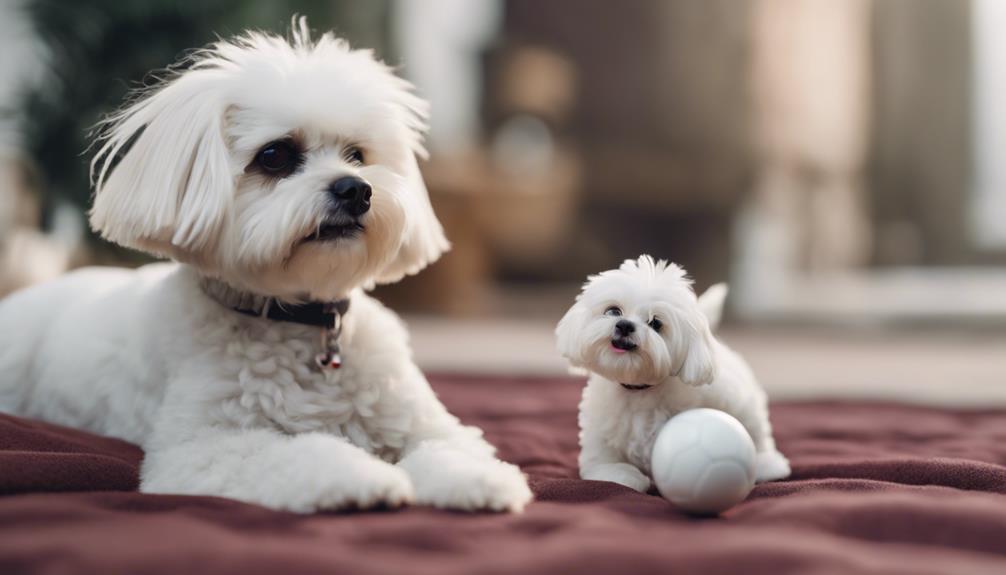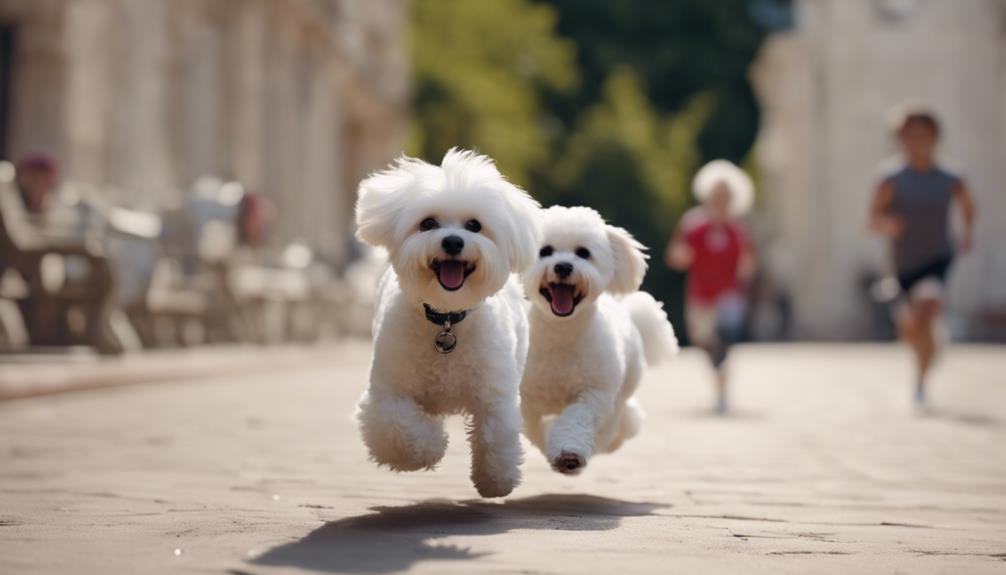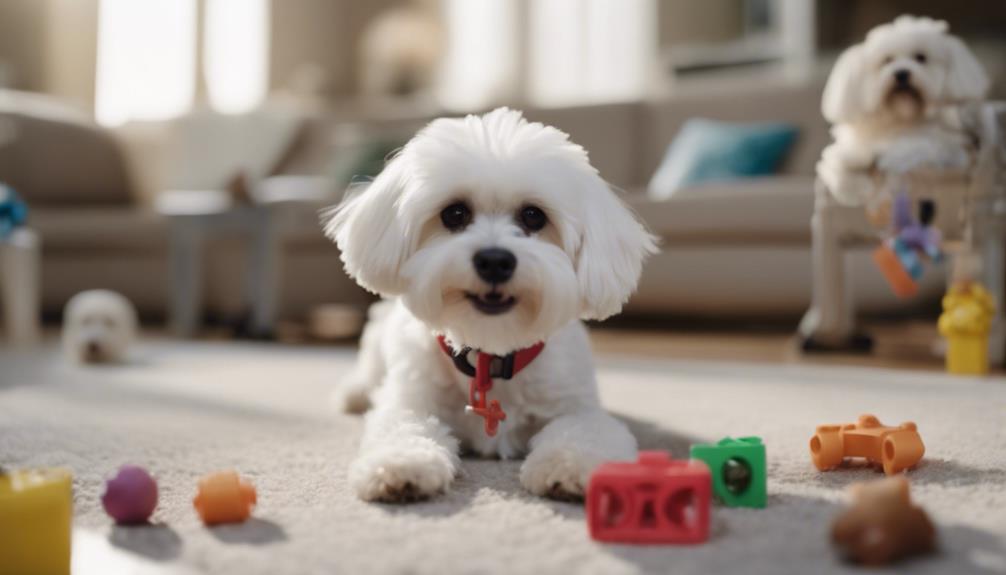When pondering over the Maltese versus Bichon Frise debate, the fluffy white breeds’ similarities and differences may surprise you. From their temperament to grooming needs, these pint-sized pups offer contrasting characteristics that can make choosing between them a challenging task.
Whether you seek a spirited companion or a laid-back lapdog, each breed has its own unique charm that could sway your decision in unexpected ways. So, if you’re on the fence about which of these fluffy white breeds is the ideal match for your lifestyle, exploring their distinctive traits further might shed some light on your decision-making process.
Temperament

When comparing the temperament of Maltese and Bichon Frise breeds, it’s essential to consider their distinct personalities and behavior patterns.
Maltese dogs are known for their affectionate and gentle nature. They tend to form strong bonds with their owners and exhibit a loyal and loving demeanor. Maltese are often described as playful and lively, enjoying interactive activities with their human companions. Additionally, Maltese dogs are known for their alertness and can be good watchdogs despite their small size.
On the other hand, Bichon Frises are characterized by their cheerful and outgoing personalities. These dogs are social butterflies, often seeking attention and affection from everyone they meet. Bichons are known for their friendly disposition and adapt well to various environments, making them excellent family pets. They’ve a playful and mischievous side, which adds to their charm and endears them to many.
In terms of behavior patterns, Maltese dogs may sometimes exhibit a stubborn streak, requiring consistent training and positive reinforcement. On the contrary, Bichon Frises are generally eager to please and respond well to training sessions. Both breeds thrive on human interaction and may experience separation anxiety if left alone for extended periods.
Understanding these differences in temperament can help potential owners choose the breed that aligns best with their lifestyle and preferences.
Grooming Needs
Considering the distinct temperaments of Maltese and Bichon Frise breeds, it’s essential to now focus on their grooming needs to provide comprehensive care for these fluffy white breeds. Both the Maltese and Bichon Frise have beautiful, long, white coats that require regular grooming to keep them looking their best.
The Maltese breed has a single-layered coat that’s long, silky, and flowing. This coat is prone to matting and tangling, so daily brushing is recommended to prevent any knots from forming. Regular baths are also necessary to keep their coat clean and shiny. Additionally, frequent grooming around the eyes is crucial to prevent tear staining, a common issue in Maltese dogs.
On the other hand, the Bichon Frise has a double-layered coat with a soft, dense undercoat and a curly, textured outer coat. This breed is considered hypoallergenic, as they shed minimally. However, their coat requires regular grooming to prevent matting and maintain its signature fluffy look. Brushing a Bichon Frise several times a week is necessary to keep their coat free of tangles and mats.
Both breeds benefit from professional grooming every 4-6 weeks to maintain their coat’s health and appearance. Regular grooming not only keeps them looking adorable but also plays a vital role in their overall well-being.
Exercise Requirements

To ensure the optimal health and happiness of Maltese and Bichon Frise breeds, understanding their exercise requirements is crucial for their overall well-being. Both the Maltese and Bichon Frise are small breeds that thrive on moderate exercise tailored to their size and energy levels.
Maltese dogs are generally content with short walks and indoor play sessions. They aren’t high-energy dogs but still require daily exercise to stay healthy. A daily walk around the block or a fun play session indoors can help meet their exercise needs. It’s important to monitor their activity to prevent overexertion due to their small size and delicate nature.
On the other hand, Bichon Frises are a bit more energetic than Maltese dogs. They enjoy playtime and interactive activities that engage their minds. Daily walks and interactive play sessions are essential for Bichon Frises to prevent boredom and maintain their overall well-being. Engaging them in activities like fetch or agility exercises can help keep them physically and mentally stimulated.
Regardless of the breed, it’s crucial to tailor the exercise routine to your dog’s individual needs. Monitoring their weight, energy levels, and overall health can help you adjust their exercise regimen accordingly. Regular exercise not only keeps them physically fit but also contributes to their mental stimulation and emotional well-being.
Health Considerations
Understanding the health considerations specific to Maltese and Bichon Frise breeds is essential for maintaining their overall well-being. Both Maltese and Bichon Frise are generally healthy breeds, but like all dogs, they’re prone to certain health issues that owners should be aware of.
Maltese dogs are susceptible to dental problems due to their small mouths and crowded teeth. Regular dental care, including brushing their teeth and providing dental chews, can help prevent issues such as tooth decay and gum disease. Additionally, Maltese dogs may be prone to respiratory problems, especially in hot or humid weather, due to their flat faces. It’s important to keep them cool and avoid strenuous exercise in extreme temperatures.
On the other hand, Bichon Frises are prone to skin allergies, which can cause itching and discomfort. Maintaining a proper grooming routine, including regular baths with a gentle shampoo, can help alleviate skin issues. Bichon Frises are also prone to developing certain genetic conditions such as hip dysplasia and progressive retinal atrophy. Regular check-ups with a veterinarian can help monitor these conditions and provide early intervention if needed.
Training and Socialization

When training and socializing Maltese and Bichon Frise breeds, consistency and positive reinforcement are key for fostering well-behaved and sociable dogs. Both breeds are known for their intelligence and eagerness to please, making them relatively easy to train with the right approach. Begin training early to establish good behaviors and prevent any undesirable habits from forming.
Socialization is crucial for both Maltese and Bichon Frises to ensure they’re comfortable around other dogs, animals, and people. Expose them to various environments, sounds, and experiences from a young age to help them grow into confident and well-adjusted companions.
Due to their sensitive nature, harsh training methods should be avoided as they can lead to fearfulness and anxiety in these breeds. Instead, opt for positive reinforcement techniques such as treats, praise, and playtime to motivate and reward good behavior. Remember to keep training sessions short and engaging to prevent boredom and maintain their focus.
Consistency is key when training Maltese and Bichon Frises; set clear rules and boundaries and enforce them consistently. Establishing a routine for feeding, walks, and training sessions can help these breeds feel secure and understand what’s expected of them.
Conclusion
In conclusion, both the Maltese and Bichon Frise are wonderful fluffy white breeds with their own unique characteristics. While the Maltese tends to be more affectionate and sensitive, the Bichon Frise is known for being playful and outgoing.
Grooming needs, exercise requirements, health considerations, and training and socialization all play a role in determining which breed is the right fit for you. Ultimately, both breeds make great companions for the right owner.


